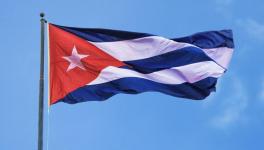“We are Going to Resist Until the Last consequences”: Bolivians Bravely Fight Back Against Coup
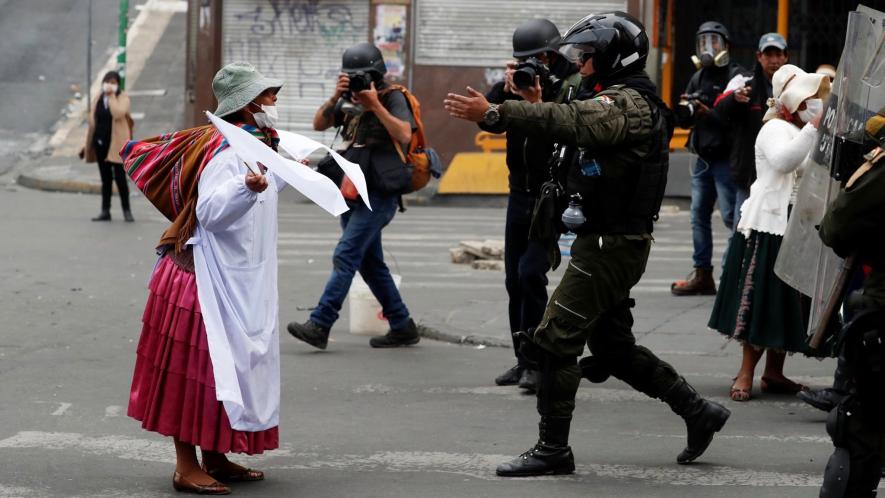
Indigenous woman marches against the coup in Bolivia. Photo: Redfish
It has been five days since the violent, racist coup d’état forced the resignation of President Evo Morales and Vice-president Álvaro García Linera. Since then, the people of Bolivia and the world have remained firm in their resistance against the coup and in defense of Morales and the process of change in the country. Across Bolivia, people are facing heavy repression from the Armed Forces, the Police and fascist groups but still they remain determined both on the streets and within institutional spaces to reject and fight back against the coup.
Resistance
The city El Alto, which neighbors the capital La Paz and whose inhabitants are mostly Indigenous and working class, has been the center of the mobilizations in support of Morales. Protesters have been marching from El Alto to the capital daily to demand the resignation of the opposition senator Jeanine Áñez, who proclaimed herself ‘interim president’ on November 12.
Protesters have also erected road blockades surrounding the capital in order to stop the flow of supplies into the city and several hundreds have begun a protest-camp outside Plaza Murillo where the major government buildings are located, including Congress and the Presidential Palace.
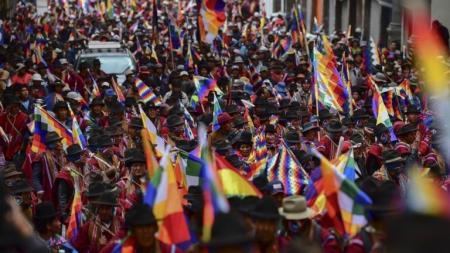
Thousands are mobilizing against the coup in Bolivia and the Indigenous symbol the Wiphala has become the symbol of the resistance against the racist, white, conservative sectors behind the coup. Photo: AFP
The Executive Committee of the United Trade Union Confederation of Bolivia (CSUTCB), the Trade Union Confederation of Intercultural Communities of Bolivia, the Peasant Workers Federation ‘Ponchos Rojos’, the Six Federations of the Tropic of Cochabamba, among others, have manifested their complete support to Morales and his process of change. They have said that these demonstrations would not stop until Morales could resume his position as President of the Plurinational State in Bolivia.
A member of the organization Tupac Katari told journalist Marco Teruggi on the streets of La Paz that their resistance against the coup supporters and the right-wing is historic. “Today is November 15, one day like today [in 1781] they killed our great leader Tupac Katari because he was strong, because he fought for the peasant class, because he fought for the Aymaras, Quechuas, and Guaranís [Indigenous nations in Bolivia] and those in the countryside in general,” he explained, “And what did they do? To teach a lesson to all of the peasant class, they dismembered him using four horses because he did not give up and swear allegiance to the Spanish crown. So they tied him to four horses to stretch him but he was so strong that they had to use the machete to dismember our great leader.”
For this protester and many others, their resistance is about carrying on the legacy of anti-colonial resistance of Katari and many other Indigenous leaders, “I am from the land of Tupac Katari, I am from the Aroma province and I will not surrender. We are going to resist until the last consequences because we have already taken down a right-wing leader, who is also a coup supporter, a dictator, Gonzalo Sánchez de Lozada that was an assassin and now the North American empire has him there as the golden boy. Now they have brought their student Jeanine Añez, as well as Luis [Fernando] Camacho…but they will pay because they can silence the people for a moment but the people have memory and we will not surrender, we are not willing to surrender, we will struggle, and even if we have to die, we will die.”
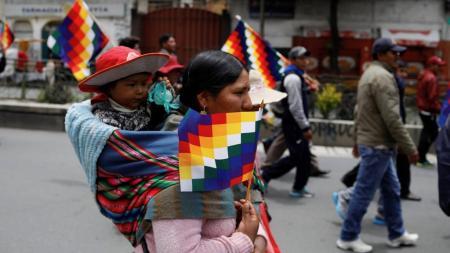
Indigenous women have been at the forefront of the protests against the coup in Bolivia. Photo: Redfish
Repression
The coup supporting Police Force and Armed Forces have unleashed brutal repression against those in the streets against the coup. They are attacking the multitudinous mobilizations with tear gas, firing at close range with firearms, beating up protesters, and have also been arresting people suspected of pertaining to the Movement Towards Socialism (MAS) and carrying out violent house raids.
They are the same forces that turned a blind eye to the right-wing groups committing violent acts against members of the MAS and sustaining road blockades and strikes in the days following the general elections and leading up to the coup. Now the US-trained repressive apparatus in Bolivia has been fully activated to stop the Bolivian people from demanding that their votes in the elections be respected, that the illegitimate Jeanine Añez step down, and that the right-wing cease acts of violence and racism.
According to a report compiled by the Latin American Center for Strategic Analysis (CLAE), the International Committee of Youth for Peace in Latin America, and Generation Evo, the escalation of violence after the civic-military coup has already cost 12 deaths and more than 530 have been injured. The report was released prior to the massacre committed in Sacaba, Cochabamba wherein Armed Forces and the Police fired tear gas and live bullets at protesters and killed at least 5 and injured hundreds.
Ruddy Uria, the Director of Communications of the National Police said on November 13: “We are going to organize groups in all of the cities where the greatest level of violence exists, we will go to the focus points that have been identified and retake the city. I ask the citizens to collaborate with us, and to the people who do not know that democracy has returned to our country, that they abstain from committing excesses, we will proceed to arrests, we will catch all of the heads that are creating chaos in our country.”
Bolivia’s Guaidó
On November 12, right-wing Senator Jeanine Áñez declared herself ‘interim president’ of Bolivia in a session of Congress that did not meet quorum. She was later decorated with the tri-color presidential sash by members of the Armed Forces and accompanied by far-right opposition leader Fernando Camacho as she celebrated her proclamation with a bible in her hand. Her self-proclamation has been widely condemned as illegitimate due to the lack of quorum, but that has not stopped Añez from adopting measures and electing a new cabinet.
In addition to the mass rejection of Añez for illegitimately seizing power, she is also a representation of the regressive, racist, conservative sectors in Bolivia. Her declaration that “the bible has returned to the palace” perfectly synthesizes the motivating ideological factors behind this coup. The white conservative minority in Bolivia could not tolerate an Indigenous, coca farmer as President who is pro-people, and pro-working class, who made Bolivia a secular state and does not abide by the diktats of US imperialism.
Following her self-declaration, a series of racist tweets written by Añez in 2013 were uncovered which have since been deleted. “I dream of a Bolivia free of Indigenous satanic rituals, the city is not for the Indians, they should go back to the high plains or to Chaco,” she wrote.
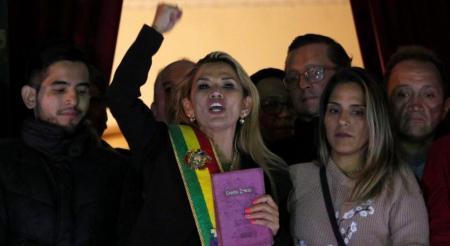
Self-proclaimed âinterim presidentâ Jeanine Añez, with a bible in hand.
Añez’ declaration has been recognized by the United States, Colombia, Brazil, the UK, Guatemala, and Russia.
Meanwhile Añez declared that she recognized the other self-proclaimed ‘interim president’ on the continent, Juan Guaidó of Venezuela, and cut diplomatic relations with the constitutional government of President Nicolás Maduro and ordered all Venezuelan diplomatic staff to leave the country.
Cuban doctors in Bolivia have also been targeted by government officials. On November 13, four members of the Cuban Medical Brigade in El Alto were arrested and accused of financing and instigating anti-coup protests.
Institutional Fight
In the hours before and after Morales and García Linera’s resignation, a series of ministers and legislators resigned from their posts due to a campaign of threats and violence. To give one example, Victor Borda, the president of the Chamber of Deputies from MAS, was forced to resign on November 10 after right-wing mobs burned his house and kidnapped his brother, he declared “I renounce from the Chamber of Deputies…hopefully at least it can preserve the physical integrity of my brother that has been taken hostage.”
The threats and intimidation to state functionaries was a key element of the coup plan as it opened up space for the right-wing to intervene and seize power. However, MAS legislators have been regrouping and fighting back in the legislative realm as they have a majority in both the Chamber of Deputies and the Senate.
On Thursday, after attempts by the security forces to violently block the entrance of MAS legislators to the Plurinational Assembly, composed of the Chamber of Deputies and Senate, MAS was able to wage an institutional counter attack. In sessions with quorum, Sergio Choque of MAS was elected as the new president of the Chamber of Deputies and Mónica Eva Copa was elected as the new president of the Senate.
Choque announced that he plans to push forward legislation so that the Armed Forces are taken off the streets and vowed to work to pacify the country. Choque declared that him and his party do not recognize the self-proclaimed ‘interim president’ Añez as she violated several constitutional norms.
International
Social movements, trade unions, political parties and leaders across the world have maintained strong in their rejection of the coup carried out against Morales and the brutal attacks carried out by the Armed Forces and the Police against the Bolivian people who are resisting the coup.
An extraordinary meeting of the platform Bolivarian Alliance for the Peoples of Our America-People’s Trade Treaty (ALBA–TCP) was held in Managua, Nicaragua on Thursday November 14 in order to address the pressing situation in Bolivia.
In a declaration released following the meeting they declared, “We categorically condemn the coup d’état carried out against the Government of brother Evo Morales Ayma, President of the Plurinational State of Bolivia, the persecution and disproportionate violence to which his Ministers and other government functionaries are submitted to, as well as leaders and their families.”
They also saluted Mexico for granting political asylum to Morales and García Linera as well as other progressive leaders for standing against the coup. They denounced the declarations of the government of Donald Trump, “which show both his support to the coup d’état in Bolivia as well as the threat to the legitimate, sovereign, and free governments of the brother republics of Nicaragua and Bolivarian Venezuela.”
Get the latest reports & analysis with people's perspective on Protests, movements & deep analytical videos, discussions of the current affairs in your Telegram app. Subscribe to NewsClick's Telegram channel & get Real-Time updates on stories, as they get published on our website.

















